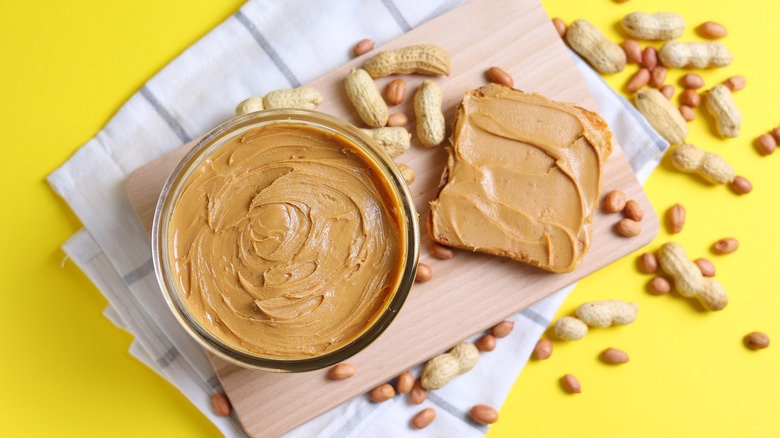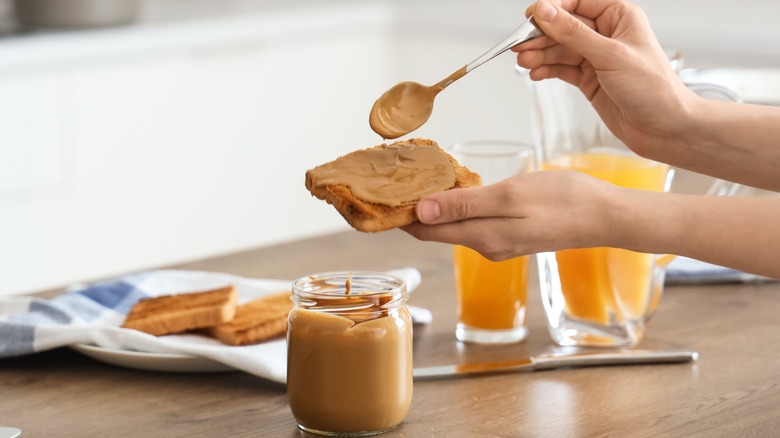Can Peanut Butter Reduce Inflammation? Here's What We Know
Your immune system is quite the fighter when it comes to harmful pathogens and substances. Each moment, your body is doing its best to maintain balance as a fine-tuned system, but your immune system goes right to work when it recognizes potential harm. When you have a cold, your immune system sends inflammatory cells to fight it off. You might also notice swelling and pain from inflammation when you stub your toe. This is known as acute inflammation because it's temporary.
Problems occur when you have chronic inflammation. Your hard-working immune system continues to fight, and in some cases, it might fight healthy cells and result in an autoimmune disorder. Chronic inflammation can also result in conditions such as diabetes, cardiovascular disease, arthritis, and allergies. You could put your body at risk for chronic inflammation if your diet is rich in saturated fats and refined sugar. Because peanut butter has some nutrients that are known to reduce inflammation, peanut butter could be part of an anti-inflammatory diet. However, research hasn't quite found enough supporting evidence.
Nutrients in peanut butter that could reduce inflammation
Even though two tablespoons of peanut butter have just 3 grams of saturated fat, you don't want to eat too much peanut butter if you want to fight inflammation. Peanut butter has 26% of your recommended daily value for niacin (vitamin B3), which can boost circulation and cool inflammation. Almost 2 milligrams of vitamin D are found in peanut butter. A vitamin D deficiency may be linked to an increase in inflammation, and vitamin D supplements have been found to reduce inflammation, according to a 2022 article in Frontiers in Endocrinology.
Selenium is an important mineral found in peanut butter, and low levels of selenium might be linked to cancer, cardiovascular disease, and cognitive decline, according to the National Institutes of Health. Selenium also supports your immune system, and you'll get 24% of your daily amount from peanut butter.
Peanut butter's possible anti-inflammatory properties might be linked to its fatty acids. Most of the monounsaturated fat in peanut butter comes from oleic acid. That's the same fatty acid found in olive oil. The 6.3 grams of oleic acid in peanut butter could reduce inflammation and cholesterol.
What science says about peanut butter and inflammation
Harvard Medical School considers the Mediterranean diet, the DASH diet, and Dr. Weil's Anti-Inflammatory diet to be the best in class in terms of fighting inflammation. They emphasize fish, fruits, vegetables, seeds, and nuts for their anti-inflammatory properties. Although nuts such as almonds, walnuts, and pistachios are indigenous to the Mediterranean, where does peanut butter fit into an anti-inflammatory diet?
A 2023 review in Nutrients found inconsistent evidence that nuts collectively can reduce inflammation, but specific nuts such as almonds and walnuts might be more powerful anti-inflammatory nuts. Peanut butter was never mentioned for its specific ability to fight inflammation. A 2016 analysis in the American Journal of Clinical Nutrition found that eating nuts five or more times a week was linked to lower levels of specific inflammatory markers. Even though peanuts showed a similar link, there wasn't the same connection between peanut butter and lower levels of inflammation. The researchers believe that processing peanut butter and including unhealthy ingredients in peanut butter formulas might somewhat degrade the anti-inflammatory potential of peanut butter.



